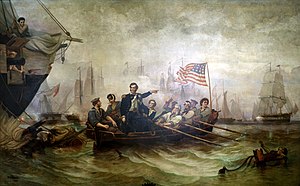Battle of Put-in-Bay
| Battle of Lake Erie | |||||||
|---|---|---|---|---|---|---|---|
| Part of the War of 1812 | |||||||
 Battle of Lake Erie by William Henry Powell, painted 1865, shows Oliver Hazard Perry transferring from Lawrence to Niagara |
|||||||
|
|||||||
| Belligerents | |||||||
|
|
|
||||||
| Commanders and leaders | |||||||
|
|
|
||||||
| Strength | |||||||
|
|||||||
| Casualties and losses | |||||||
|
|
||||||
The Battle of Lake Erie, sometimes called the Battle of Put-in-Bay, was fought on 10 September 1813, in Lake Erie off the coast of Ohio during the War of 1812. Nine vessels of the United States Navy defeated and captured six vessels of the British Royal Navy. This ensured American control of the lake for the rest of the war, which in turn allowed the Americans to recover Detroit and win the Battle of the Thames to break the Indian confederation of Tecumseh. It was one of the biggest naval battles of the War of 1812.
When the war broke out, the British immediately seized control of Lake Erie. They already had a small force of warships there: the sloop-of-war Queen Charlotte and the brig General Hunter. The schooner Lady Prevost was under construction and was put into service a few weeks after the outbreak of war. These vessels were controlled by the Provincial Marine, which was a military transport service and not a naval service. Nevertheless, the Americans lacked any counter to the British armed vessels. The only American warship on Lake Erie, the brig Adams, was not ready for service at the start of the war, and when the American army of Brigadier General William Hull abandoned its invasion of Canada, Adams was pinned down in Detroit by the British batteries at Sandwich on the Canadian side of the Detroit River. The British Major-General Isaac Brock used his control of the lake to defeat Hull's army at the Siege of Detroit, by cutting the American supply lines and rapidly transferring himself and some reinforcements to Amherstburg from where they launched a successful landing on the American side of the Detroit River.
...
Wikipedia
